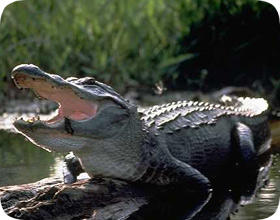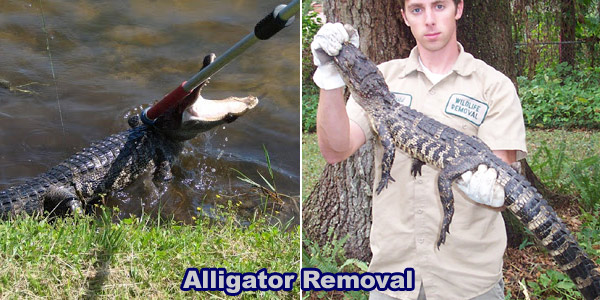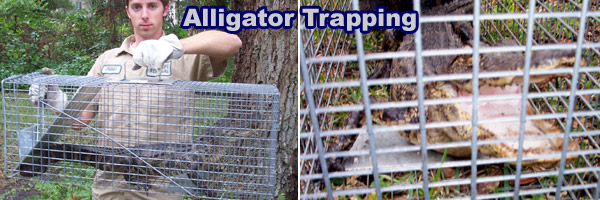-
info@aaanimalcontrol.com
Call us for help in your town
Humane Wildlife Education
How to Get Rid of Alligators
 Alligators are some of the oldest living species on the earth, dating back to prehistoric times. There are two types of alligators, and they are known to live near lakes, swamps, rivers and other fresh water areas. The babies can grow up to
be adults 15 feet long and be over 1000 lbs in weight. However, it was recorded in Louisiana that one was found over 19 inches long. Imagine that!
Alligators are some of the oldest living species on the earth, dating back to prehistoric times. There are two types of alligators, and they are known to live near lakes, swamps, rivers and other fresh water areas. The babies can grow up to
be adults 15 feet long and be over 1000 lbs in weight. However, it was recorded in Louisiana that one was found over 19 inches long. Imagine that!
Most people are concerned about alligators if they become too large, and might pose a threat to pets or people. Yes, it does happen: alligators do sometimes attack and kill both people and
pets. However, this is rare, and most attacks come during the mating season in late spring.
Need American Alligator removal in your hometown? We service over 200 USA locations in the south with Alligators! Click here to hire us in your town and check prices - updated for year 2020.
They have about 75 teeth and it's difficult to pinpoint what their lifespan is; however, the oldest alligator reported in the United States died at 75 years old. Mostly found in Florida and Louisiana, they have also been seen in Georgia, Alabama, Mississippi, Oklahoma, Arkansas, Texas and North Carolina. While male alligators like to spend time alone, you will often see that smaller alligators run in groups. Alligators move slow due to their low metabolism and heavy bodies, but when catching their prey or fighting, you may notice them deliver a few brief bursts of speed.

What They Eat
Younger alligators like to eat worms, small fish, crustaceans and insects while larger alligators will take on the much bigger prey including fish, deer, birds, turtles and a variety of other mammals. They do this by grabbing their prey with a bite and dragging them in the water to endure the fate of drowning. This method is referred to as the ‘death roll' where the alligator takes the prey and rolls it over and over until it has drowned. The muscles in their lower jaws are extremely powerful when they're closed, but weaker are the muscles that open them, which is why it's not too difficult for a human to hold an alligators mouth shut with their hands.
Read more about alligator biology and facts here.
Alligator Nuisances
An alligator in the wild may not be so bad; however, when it's in your yard, your pets are in danger and so is your family. Alligators are not known to eat humans, but they don't completely disregard the idea either. Not to mention, they will attack if they feel threatened. This can be dangerous for small children who may not understand the extent of bothering one. Besides, some people have lakes that they like to swim in which might not be such a good idea if there are alligators enjoying the same lake.
How to Get Rid of Them
There are no known repellants or toxicants registered to remove alligators off of your property. Yet, toxicants and repellants are only temporary for removing any animal including an alligator off of your property and they can be harmful to humans, pets and other animals that they are not meant for.
Traps
One thing that alligators are very much attracted to is baits. In Louisiana, the common way for trapping an alligator is by baiting a hook. A fish hook is implanted inside of chicken, beef lungs, fish or nutria and hung from a tree limb over the water. Hanging about two feet from the water the alligator moves in for the kill. Once the alligator has taken the bait, the fish hook digs deep into its stomach and then it is pulled out of the water using the rope attached to the hook. This method of trapping an alligator is not recommended because it can kill the alligator or deliver serious injuries to the brain.
In the case of setting traps for alligators, different states have different laws that you must abide by. You may have to have a permit or license to perform trapping it yourself. In most cases you can check with your Department of Wildlife to find out about these regulations. The best way to trap and alligator the humane way is by using a self-locking snare. The bait is placed inside of a self-locking snare near the area the alligator is often seen and left during the evening time when alligators are more likely to feed. Once the alligator sticks its head in to snatch what he thinks is free food, he sets the trigger off and is captured. These traps can be somewhat difficult to set up. It can also be dangerous if you think an alligator is trapped and as you move in you realize that he's not. Such trapping is better left to an expert.
Read more about alligator trapping here.

SOME SPECIFIC ALLIGATOR AREAS OF INTEREST:
How To Get Rid Of Alligators In Your Pond
If you have alligators in your pond, then you need to exercise extreme caution. They can get very large and very dangerous. They pack a bite and you do not want to be on the wrong end of that as they will not let go. It is very easy to lose a limb to a gator bite. There is also a very real danger to your house pets and small children. Why are we telling you all of this? Because you need to take this problem very seriously. There is no realistic or safe way for an untrained person to get rid of a gator so call a professional.
There are different trapping methods such as hanging large meat on hooks, but be aware this will damage or kill the alligator. Once the alligator has been moved then you can do something to keep them out of the pond. If it is a small pond then you should do your best to fence the gators out. You do not need more than a 4 foot tall fence as that should be enough to keep even the larger alligators out. You should also never leave any food source outside which the gators can eat.
How To Remove Alligators From Your Yard
If you have found alligators in your yard and you want to remove them, then please make sure that you exercise extreme caution. Removing alligators (even the smaller ones) is not safe and should be left to a professional. If you come face to face with an alligator in your yard, then make sure that you have your pet on a leash and that you do not touch it. If the alligator hisses, then that is a warning that it thinks you are invading its territory so move back slowly. While rare, an alligator can sprint at 35 MPH for short distances.
Make sure to keep your yard picked up so you don't have trouble with these guys. The first thing to do is to make sure that you clean after yourself when you have a BBQ and never leave food outside. It is also a good idea to install a fence. A fence is particularly a great idea when you have a pool or a pond on your property. Keep in mind that these animals are dangerous and should not be approached on land or in water by anyone but experts.
How To Get Rid Of Alligators In Your River
An alligator sighting can be a common thing in some parts of the country, and that is especially true in rivers. If you see an alligator in the water then you should not go swimming. Though they can be agile on land, they can be deadly in the water. You may be tempted to try to trap the alligator yourself, but unless you are experienced you should not try it. If you are experienced then you will need at least two people and never attempt to do so in the water no matter the amount of experience you have.
You should know that if you see an alligator one day there is a very good chance that it will soon be gone. They do not like to be around people, but a river is its habitat so it is humans that are invading and not the other way around. Many people use large hooks hanging three or four feet above the water with meat on them. The alligator will attack the meat, imbedding the hook in its throat or stomach. Be aware this will harm or kill the alligator. To keep the alligators away make sure that you do not leave food outside and you fence your property so that it does not come back in.
How To Get Rid Of Alligators In Your Lake
If you live by a body of water in an area where alligators are, then you are likely to see these large reptiles somewhere by your home. Alligators feel at home in the water and by the shore so it is important that if you see an alligator that you stay away from the water. Alligators do not like to be around people so there is a very good chance that you will not see it in a day or two. An alligator that remains in an area must be removed and placed in a safer location. The trapping and moving however should be done by professionals as they are a rather dangerous animal.
You will notice that a net is never used to catch an alligator. The reason is that most alligators will be able to break the net and escape. The reason they are in your area of the lake is because they have found a food source and if at all possible that should be removed so that the alligator does not come back. That could be other animals like beavers or muskrats. If you take away the prey, then the alligator is likely to search for food somewhere else.








































